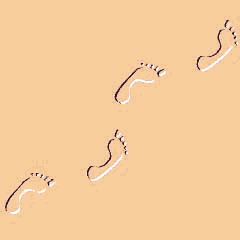

ABORN CO FOUNDER GEN GOADS PERSONAL
WEBPAGE
|
Thursday Nov 4 1999 GEN'S STORY PUBLISHED IN: ACCESS DENIED |
|
ADOPTEE LOOKING FOR
ANSWERS ONLY TO FIND DOORS CLOSED


|
Imagine being diagnosed with a
physical problem or disease. You ask your doctor questions. Is it fatal?
Is it curable? Is it commom? Is it hereditary? Some of the questions can
be aswered by your doctor, or with a little extra research on your own. You can check out the library and various organizations to find out about the problem. And of course you can check your own family background to see if Great Aunt Jane's or Grandpa Joe had health problems related to what you have. For most people, finding the answers to questions about their background health history is fairly simple. But, if you are one of the millions of adoptees across the country, that information is as unaccessible as if it were locked in a combination-less steel safe. Ask Genevieve Goad. She knows she was born October 30 1944. Her adopted father paid $4000, a very large sum for the times, to Catholic Charities to handle the adoption procedures in Jackson County, Missouri. She was born at Fairmont Maternity Home, the name later changed the Williams House, at 1414 East 27th Street in Kansas City. She thinks her biological mother was from Iowa because of travel restrictions during World War II, but shes not sure. According to the information she does have, she was a healthy baby, weighing 8 pounds, 6 ounces. She was born at 12:30 a.m., according ot her ammended birth certificate. The rest of the information is sketchy at best. Genevieve had polio as a child. In later years she developed Fibromyalgia Syndrome, a disease that affects ligaments and tendons causing almost constant pain and fatigue. It is unrelated to the polio. It is aggrevated by stress. And, Genevieve says, it is believed to be hereditary. But she may never know the rest of her medical heritage. At age 55, with both her adoptive parents dead, she still cannot access her adoption records. They are sealed permanently, by the courts. Attempts to access the records have been denied. " I found out I was adopted when I was eight years old," she said. ' I had a playmate tell me I was adopted. I was always told I was trash." Her adoptive parents were Louis F. and Genevieve V. Oliva. She said she did not have a very good childhood and that she was always a handful. She did have a sister who was also adopted but when Genevieve was 11 years old, her parents had a natural child then later three more. As a result, Genevieve and her sister were pushed back, in favor of the natural children. Both parents were alcoholics and as a result , she said things were never really normal. "My mother died in 1974 without telling me anything about my background. Anything I asked as a child was treated with a " You don't need to know" attitude. Before my Dad died in 1984, he gave me papers about my adoption, but with all the pertienet information marked out. I'm now in my fifties and I'm stll not allowed to know where I'm from or who I am." The reasons for sealing the records are many. There is the protection fo the child, protection of the birth parents, but today, it may be simply for money. For example the state of Missouri will provide a single typed page for $50 and there is no guarantee all the infromation needed is contained in that single page, or that it is factually accurate. Catholic Charities will search the records for $200 down and $100 an hour. Somewhere , someone is making millions of dollars from either the adoption fees, services at the time of the adoption, to the fee charged for the search. It seems that if you the right money or the right connections those "Sealed" records can somehow become unsealed. However the average adoptee, with little money to spare but who desperately needs the medical infromation the records may contain, does not have the key to unlock the needed personal information. In North Carolina and Ohio for example, it is deemed a felony to search for information, Geneveieve said. A very few women with either money or connections, successfully blocked Oregon legislation that would have allowed adoptees in that state access to their medical and genetic records and actual birth certificates. In Missouri, adoption records were not closed until 1941, just three years before Genevieve was born. Adoption laws have been ammended over the years but Genevieve said currently there are no bills in the Missouri House to change the laws, making it easier for adoptees to access their personal information. At this time only three states allow for an open search of adoption records, she added. In 1990, it was estimated that 2-4% of all adotpees searched for their birth parents. An earlier study, conducted in the 1980's , estimated around 500,000 adult adoptee were seeking or had found their birth parents. It is also estimated that there are about 6 million adopted people who live in the United States. However, should any of those 6 million people try to access their own vital, personal hsitories, most will find that access denied. In the Kansas City newspaper classifieds of the 1940's, there were all sorts of ads, for maternity home care for girls. Young women from all over the country came, or were sent to Kansas City to such maternity homes as the Fremont maternity home or to the Willows, which was one of the largest at the time. The Willows, at 2929 Main street in Kansas City operated from the early 1900's to about 1969. After operations ceased, the older records were taken to the back yard and burned. The building was later demolished. The Willows printed a survery covering the decade from 1920 to 1929 during which time 3021 girls came there to give birth. These girls ranged in age from 12 to over 26, with 377 girls at age 18. There were 271 girls aged 26 and the average age was 30. Occupations ranged from students (817) to home girls (804) to teachers (295) and business college trained (267) to a long list of other legitimate occupations. Religious backgrounds included Methodists (720), Baptists (345), Catholics (273) to Jewish (6) and Mennonite (1). Those with no church affiliation numbered at 452. The girls came from Missouri (488) and Kansas (417) of course, but also from Colorado (60), Pennsylvania (7), Connecticut (20), Hawaii (1) and Canada (3) and many other states. Most of the girls were not "bad" girls, but simply ones who had made a mistake in judgement. And, the Willows was just one of such homes in the Kansas City area to provide needed care for the girls and their babies. There were no abortions performed at the homes. Genevieve is skeptical about the small amount of information she has been able to obtain about her birth parents, some of which may or may not be true. She has a feeling her adopted dad and her biological father may be the same person. Louis Oliva was from Naples, Italy. Her biological father is said to be of Italian decent, who was killed in action in the South Pacific. But then in the 1940's a lot of adoptee's fathers may have met similar fate, leaving the women to bear the child alone. Genevieve was named Sally Stewart by the maternity home nurses. It was common then to give a baby a first and last name that started with the same letter. The child before her may have been named Rita Roberts and the one after could have been a Tommy Thompson. "Knowing my roots is important to me. If I go to the doctor and need to list my medical history, I can't" she said. " I'd love to know if I had a living mother. I never had close realtions with my adopted family. I have no pictures of granparents, uncles or aunts. I'd hate to go to my grave and not know who I am. I feel like my life's a puzzle, with pieces missing. I would like to have closure". Genevieve has three children and nine granchildren. Between her and Tom, her husband of 15 years, there are 19 grandchildren, and 7 great-grandchildren. Genevieve used to manage a campground and worked in business, and was able to type rapidly. Today, the Fibromyalgia stiffness and pain has slowed her fingers. She is still able to type and works slowly on a computer keyboard, devoting much time to try and find information about herself. She has formed an organization called A-BORN, attempting to gain support, getting adoptees together for a common cause, to petition the courts to open vital birth records. Such information as genetic predisposition to certain diseases, and other necessary health related information which most people can easily obtain, is forbidden to adoptees because of the sealed records. Children who are adopted and whose families have a large number of divorces and remarriages, need that information to prevent possible marriage to unknown siblings when they become adults. Genevieve said adoptees are treated as a distinct and different class of U.S. citizens, in violation of the Civil Rights Act. She said the Government, in denying adoptees orginal birth certificates, are denying them rights to their property, a violation of the Constitution. Adoptees are discriminated against, by being denied access to or posession of, their property, their original birth certificates. "As an adult, my records are still sealed permanently, making it plain that I'm still in need of protection and restraint as if I were a child." she said. "I'm tired of being held a hostage for my deceased parents, piece of mind, my birth mother's reputation and the adoption agency's boundless wisdom." Genevieve is seeking information about herself. If you have anything that would help in her search, or you are interested in A-BORN, contact her at her e- mail address at: theladdie@webtv.net, or by "smail mail" at: Gen Goad , Route 4 Box 361 , Adrian, Missouri 64720. |

SIGN THE PETITION FOR OPEN ADOPTION RECORDS NATIONWIDE BY CLICKING
HERE
|
READ MY REUNION STORY IN THE CURRENT ISSUE OF THE ADOPTION ACTIVISM PRESS
|
Join Gen's Missouri List for help with
your Missouri Search
MissouriAdopteesandBirthparents-subscribe@egroups.com
 |
Click here to read a story about KCMO adoptions that was written on July 2, 1950 Link to article on Jackson County Adoptions ARTICLE ABOUT THE FAIRMOUNT MATERNITY HOME **********************Two of my Favorite poems******************** What Makes a Mother? Some would say it is the days spent comforting a crying babe spent rocking a feverish toddler. Spent cleaning up after a child. Who ate one too many hot dogs. They would say it is the nights. Spent listening to the breathing of an infant. Spent listening for the sound of a car in the driveway. Borrowed by a 16 year old with a new license. And they would be right. But . . . Some would say it is the days spent singing softly to an unborn child. Spent gently stroking a baby within spent loving a part of themselves. Felt, but unseen. They would say it is also the nights. Spent listening for an answer. Spent listening for their baby's first cry. Spent listening to the silence of a void that can never be filled. And they would be right as well. They have both earned their motherhood. They both deserve to be remembered. And honored. -Brenda Romanchik
|
![]()